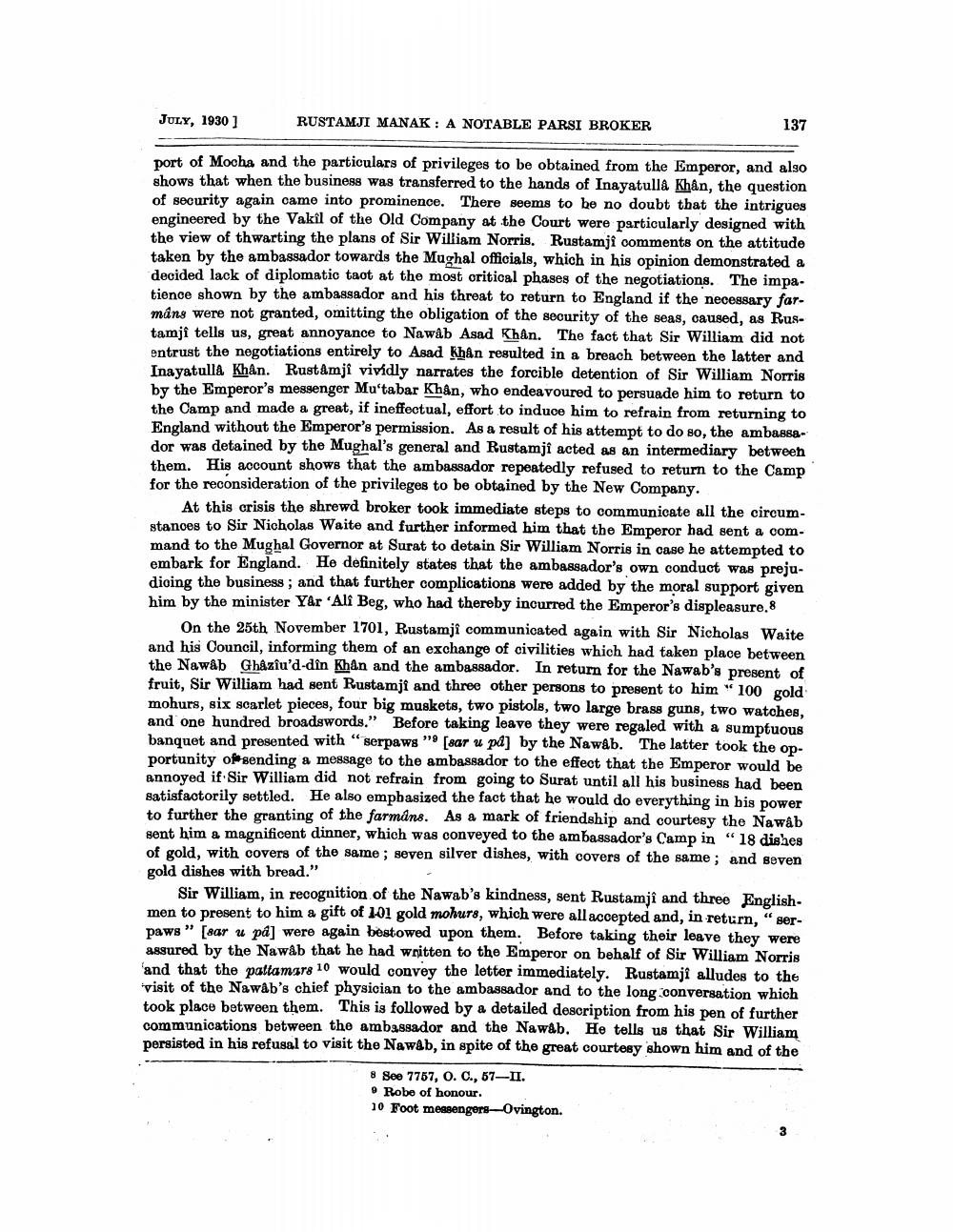________________
JULY, 1930 1
RUSTAMJI MANAK: A NOTABLE PARSI BROKER
137
port of Mocha and the particulars of privileges to be obtained from the Emperor, and also shows that when the business was transferred to the hands of Inayatulla Khân, the question of security again came into prominence. There seems to be no doubt that the intrigues engineered by the Vakil of the Old Company at the Court were particularly designed with the view of thwarting the plans of Sir William Norris. Rustamji comments on the attitude taken by the ambassador towards the Mughal officials, which in his opinion demonstrated a decided lack of diplomatic taot at the most critical phases of the negotiations. The impatience shown by the ambassador and his threat to return to England if the necessary farmans were not granted, omitting the obligation of the security of the seas, caused, as Rustamji tells us, great annoyance to Nawab Asad Khân. The fact that Sir William did not entrust the negotiations entirely to Asad Khan resulted in a breach between the latter and Inayatulla Khan. Rustamji vividly narrates the forcible detention of Sir William Norris by the Emperor's messenger Mu'tabar Khan, who endeavoured to persuade him to return to the Camp and made a great, if ineffectual, effort to induce him to refrain from returning to England without the Emperor's permission. As a result of his attempt to do so, the ambassador was detained by the Mughal's general and Rustamji acted as an intermediary between them. His account shows that the ambassador repeatedly refused to return to the Camp for the reconsideration of the privileges to be obtained by the New Company.
At this crisis the shrewd broker took immediate steps to communicate all the circumstanoes to Sir Nicholas Waite and further informed him that the Emperor had sent a command to the Mughal Governor at Surat to detain Sir William Norris in case he attempted to embark for England. He definitely states that the ambassador's own conduct was prejudicing the business; and that further complications were added by the moral support given him by the minister Yar 'Ali Beg, who had thereby incurred the Emperor's displeasure. 8
On the 25th November 1701, Rustamji communicated again with Sir Nicholas Waite and his Council, informing them of an exchange of civilities which had taken place between the Nawab Ghazîu'd-dîn Khan and the ambassador. In return for the Nawab's present of fruit, Sir William had sent Rustamji and three other persons to present to him " 100 gold mohurs, six scarlet pieces, four big muskets, two pistols, two large brass guns, two watches, and one hundred broadswords." Before taking leave they were regaled with a sumptuous banquet and presented with “serpaws" [sar u pd] by the Nawab. The latter took the opportunity of sending a message to the ambassador to the effect that the Emperor would be annoyed if Sir William did not refrain from going to Surat until all his business had been satisfactorily settled. He also empbasized the fact that he would do everything in bis power to further the granting of the farmáns. As a mark of friendship and courtesy the Nawab sent him a magnificent dinner, which was conveyed to the ambassador's Camp in “18 dishes of gold, with covers of the same; seven silver dishes, with covers of the same; and seven gold dishes with bread."
Sir William, in recognition of the Nawab's kindness, sent Rustamjî and three English. men to present to him a gift of 101 gold mohuts, which were all accepted and, in return, "serpaws" [sar u pá] were again bestowed upon them. Before taking their leave they were assured by the Nawab that he had written to the Emperor on behalf of Sir William Norris and that the pattamars 10 would convey the letter immediately. Rustamji alludes to the visit of the Nawab's chief physician to the ambassador and to the long conversation which took place between them. This is followed by a detailed description from his pen of further communications between the ambassador and the Nawab. He tells us that Sir William persisted in his refusal to visit the Nawab, in spite of the great courtesy shown him and of the
8 See 7757, O. C., 57-II.
Robe of honour. 10 Foot messengers-Ovington.




